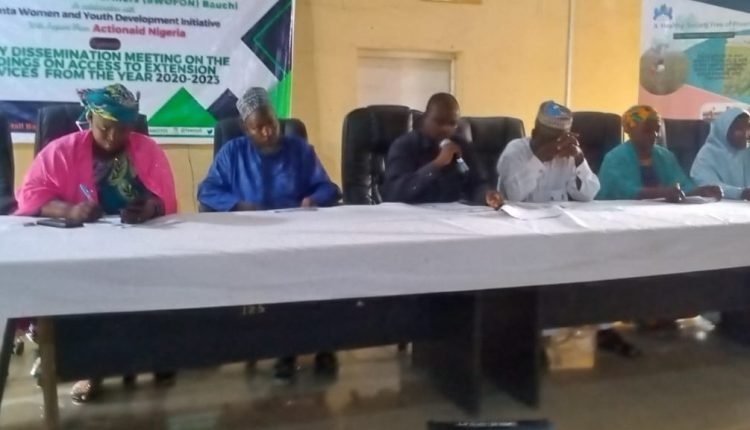Smallholder women farmers in Bauchi State have expressed deep concerns over their limited access to agricultural extension services. These concerns were voiced during a dissemination meeting on the findings of access to extension services from 2020 to 2023, held on Friday in Bauchi.
The meeting was organized by the Bauchi chapter of Smallholder Women Farmers (SWOFON) in collaboration with Fahimta Women and Youth Development Initiative (FAWOYDI), with support from ActionAid.
Hajiya Hussaina Dabo, representing the smallholder women farmers, highlighted the precarious state of food production and the unaffordability of food prices across Nigeria. She emphasized that the challenges faced by women farmers are becoming increasingly worrisome to stakeholders, as these farmers continue to suffer neglect.
Echoing these sentiments, Hajiya Kaltume Babayo stressed that access to effective agricultural extension services remains a significant challenge for women farmers. “We call on critical stakeholders, including the Federal and State Governments, development partners, and Civil Society Organizations (CSOs), to address inadequate staffing and poor funding of women farmers,” she urged.
Mrs. Dinah Daniel, Executive Director of FAWOYDI, advocated for targeted programs to support women, youth, and other marginalized groups in agriculture. She called for the extension services department to facilitate access to credit for smallholder women farmers, thereby boosting food production and increasing income. Additionally, she urged the government to allocate and release funds for extension service delivery in the state.
“Budgetary allocations should be made for capacity building of existing extension personnel to enhance their knowledge of modern agricultural practices, which they can then pass down to farmers,” Mrs. Daniel stated.
During the scorecard presentation, Mrs. Faith Adidu, Program Officer for Agriculture at FAWOYDI, advocated for improved access to agricultural extension services for smallholder women farmers. She emphasized the need for engaging policymakers at various levels to increase investment and qualitative spending in agriculture, particularly targeting smallholder farmers.
“Providing information on the rating and scoring of smallholder women farmers’ access to agricultural extension services to government officials, the media, and the public is crucial,” Mrs. Adidu noted.
The scorecard findings revealed a stark reality: only 16.7% of smallholder women farmers indicated that their cooperatives had accessed extension services from 2020 to 2023. In contrast, a staggering 83.3% reported that they had not received any services from extension workers or agents within the past four years.
These revelations underscore the urgent need for comprehensive measures to support smallholder women farmers in Bauchi State. Improved access to agricultural extension services is essential for enhancing food production, ensuring food security, and improving the livelihoods of these farmers. Stakeholders, including government bodies, development partners, and CSOs, must collaborate to address these challenges and empower women farmers to achieve sustainable agricultural development.

